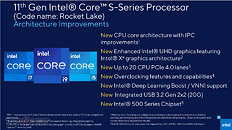Thursday, October 29th 2020

Intel Confirms Rocket Lake-S Features Cypress Cove with Double-Digit IPC Increase
Today, Intel has decided to surprise us and give an update to its upcoming CPU lineup for desktop. With the 11th generation, Core CPUs codenamed Rocket Lake-S, Intel is preparing to launch the new lineup in the first quarter of 2021. This means that we are just a few months away from this launch. When it comes to the architecture of these new processors, they are going to be based on a special Cypress Cove design. Gone are the days of Skylake-based designs that were present from the 6th to 10th generation processors. The Cypress Cove, as Intel calls it, is an Ice Lake adaptation. Contrary to the previous rumors, it is not an adaptation of Tiger Lake Willow Cove, but rather Ice Lake Sunny Cove.
The CPU instruction per cycle (IPC) is said to grow in double-digits, meaning that the desktop users are finally going to see an improvement that is not only frequency-based. While we do not know the numbers yet, we can expect them to be better than the current 10th gen parts. For the first time on the Intel platform for desktops, we will see the adoption of PCIe 4.0 chipset, which will allow for much faster SSD speeds and support the latest GPUs, specifically, there will be 20 PCIe 4.0 lanes coming from the CPU only. The CPU will be paired with 12th generation Xe graphics, like the one found in Tiger Lake CPUs. Other technologies such as Deep Learning Boost and VNNI, Quick Sync Video, and better overclocking tuning will be present as well. Interesting thing to note here is that the 10C/20T Core i9-10900K has a PL1 headroom of 125 W, and 250 W in PL2. However, the 8C/16T Rocket Lake-S CPU also features 125 W headroom in PL1, and 250 W in PL2. This indicates that the new Cypress Cove design runs hotter than the previous generation.
Source:
Intel Newsroom
The CPU instruction per cycle (IPC) is said to grow in double-digits, meaning that the desktop users are finally going to see an improvement that is not only frequency-based. While we do not know the numbers yet, we can expect them to be better than the current 10th gen parts. For the first time on the Intel platform for desktops, we will see the adoption of PCIe 4.0 chipset, which will allow for much faster SSD speeds and support the latest GPUs, specifically, there will be 20 PCIe 4.0 lanes coming from the CPU only. The CPU will be paired with 12th generation Xe graphics, like the one found in Tiger Lake CPUs. Other technologies such as Deep Learning Boost and VNNI, Quick Sync Video, and better overclocking tuning will be present as well. Interesting thing to note here is that the 10C/20T Core i9-10900K has a PL1 headroom of 125 W, and 250 W in PL2. However, the 8C/16T Rocket Lake-S CPU also features 125 W headroom in PL1, and 250 W in PL2. This indicates that the new Cypress Cove design runs hotter than the previous generation.



74 Comments on Intel Confirms Rocket Lake-S Features Cypress Cove with Double-Digit IPC Increase
Seriously, it's about time for Intel to lower themselves and stop producing one-size-fits-all type of (guess) APUs, because I don't need at all their worthless iGPU and never did, ok - companies are another thing, but individual users rarely do, and we all still have to pay for it, its development and probably flawed silicon products.
I don't want it and go make a variant without, which will be 10g less - no matter how integrated Xe became great... or didn't. Unless you make your 'One Ring, One Intel-HSA API initiative" worthy of Mordor and usable everywhere...
Something must be off there. Although test does keep track of frequencies, I suspect this runs far higher than 4.2GHz.
If true though, Rocket Lake is not going to be a dud.
IPC doesn't go up by slowing down the memory.
Seems like five years ago or more they started on skylakes replacement , it too hasn't gone to plan.
They definitely do need to start sticking to the plan though or they're not going to recover.
As for timing, they been an absolute Age on skylakes.
The skylake epoche, fitting.
Also, the rated clock speeds of Comet Lake and Coffee Lake are highly optimistic. If you look at Gamer's Nexus' review of i9-10900K, it doesn't get anywhere near a stable boost at 5.3 GHz on a single core. This is similar to my experience with trying an i7-10700K at work (stock, power limit on), it's more like 4.6-4.7 GHz at sustained loads, don't think I've seen it hit 5.0 GHz, but I've not done a "proper" test either.
If Rocket Lake achieves similar real world clock speeds of 4.6-4.7 GHz (and a little lower under heavy AVX loads), and offers an ~18% IPC gain, it will pack a serious punch. Though I wonder if Intel have to keep inflating the rated clock speed…
There is no guarantee an engineering sample is reporting accurate clock speeds.